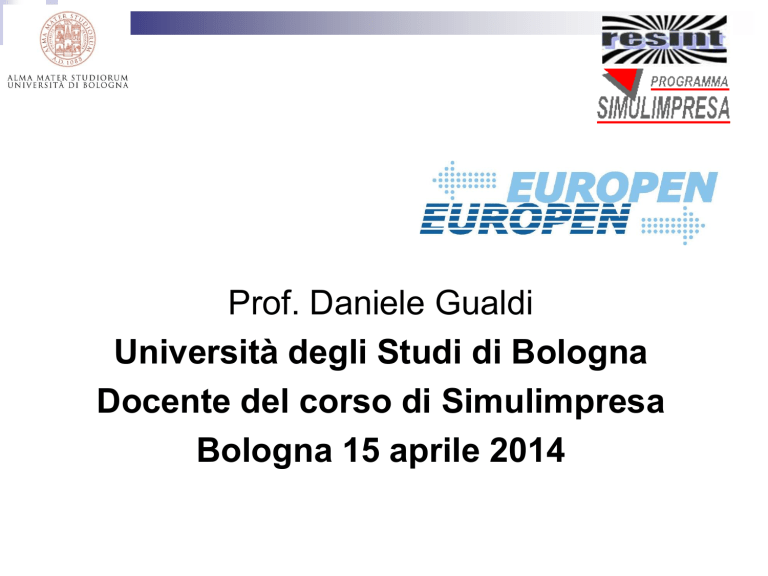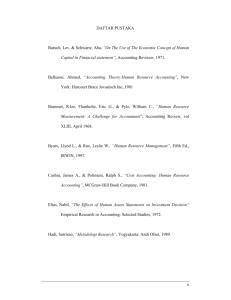UNIBO The Laboratory for Enterprise Simulation

Prof. Daniele Gualdi
Università degli Studi di Bologna
Docente del corso di Simulimpresa
Bologna 15 aprile 2014
DepliantENG17_10_2012 erting
The Laboratory for Enterprise
Simulation in Forlì and the performance
2001 -2014
Project “Collaborative Reformation of Curricula on
Resilience Management with Intelligent Systems in Open
Source and Augmented Reality”. (RESINT)
540096-LLP-1-2013-1-IT-ERASMUS-EKA of Perting Ltd
F I I I R S T A W A R D I I I N
2 2 0 0 0 9 N E W Y O R K
G L O B A
L
B U S S I I I N E S S S
C H A L L E N G E
In October 2001, with the creation of Perting
Ltd Simulated Enterprise was launched the activity of Simulated Enterprise Laboratory in connection to the course of Business
Management (Prof. Massimo Bianchi),
Simulimpresa was created to overcome the limits of the traditional teacher-student dialectic and to try to anchor knowledge by engaging students in more active roles
It is required to learn not only knowledge, but know-how and practical skills. It is important to develop the ability to work in groups, problem solving, effectively communication, and the ability to orientate in increasingly complex contexts which are constantly changing and characterized by great unpredictability.
Our goal is the development of skills that are directly targeted at rapid and easy integration into the job world
It is a shared opinion that it is necessary to widen the sphere of students’ knowledge and skills by introducing a new type of learning in University career. This could accompany the traditional methods founded upon frontal lecturing, in order to encourage a more active and participative role for students.
We believe that learning is much more effective when it occurs in situations that simulate reality, that reproduce it and force students to deal with problems. Students can rely on the knowledge they have acquired in traditional courses, apply methodologies, and make responsible management choices.
The Practice firm course aims at providing direct knowledge of how a company works through a realistic reproduction of its management, administrative and organizational methods and procedures.
The aim is to increase students’ skills and knowledge as well as to consolidate their knowledge of business subjects already dealt with in other courses.
In this way we can move from a merely theoretical learning approach to a more practical and active one.
In the simulation of a business, students are required to actively participate in the company activities. They are required to be responsible for them by playing a central role in all the aspects relating to the company management:
•accounting and drawing up of a balance sheet;
•organization;
•administrative and fiscal duties;
• internal and international trade management;
•financing, investments, relations with banks;
• application of Information, Comunication
Technology
•to allow students to experience the working climate within a company in order to reduce the gap between theory and practice,
• to improve students’ behavioural skills,
•to help students become more aware of their skills and roles,
• to allow students to apply the knowledge acquired, and to develop new skills that could be used later on in their university career
What is the goal of an experimental enterprise?
To realize an immediate link between theoretical knowledge received during studies and its applied practice founded on
action–oriented learning, where knowledge and know how represent the basis of the learning process.
Didactical goals
Practical experience
Interdisciplinary skills
Company culture
Self achievement
Personal training
Facing responsabilities
How to create an experimental enterprise?
In a classroom-laboratory that reproduces the main managerial functions, students carry on operative management with scheduled activities, bureaucratics burdens and legal constraints and fiscal duties.
The phases of an experimental enterprise
founding
Virtual business of goods and services
Accounting management
Annual accounts and budget
Close down
Marketing
Main organizational functions
Foreign affairs
Accounting
Staff accounting and human resources
There are also social organs as :
Company meeting
Board of directors
Board of advisors
Marketing
Job rotation
Accounting
Foreign
Affairs
Staff accounting and human r.
What is the experimental enterprise network EUROPEN ?
MORE THAN 400 EXPERIMENTAL
COMPANIES IN ITALY
MORE THAN 5000 EXPERIMENTAL
ENTERPRISES IN THE WORLD
WIDE NETWORK EUROPEN
Italian Network Simulimpresa
Professional Schools
Tecnical and accounting schools
Business companies
Universities
Chambers of Commerce
Employers unions
Network EUROPEN
•
Non profit association
(fonded in 27.10.1997)
•World wide network
•More than 5000 experimental companies in 40 Countries
The extention of EUROPEN
North America: Canada, USA
South America: Argentina, Brasile
Western Europe : Austria, Belgio, Danimarca,
Finlandia, Francia, Germania, Grecia, Irlanda, Italia,
Olanda, Norvegia, Portogallo, Spagna, Svezia,
Svizzera, Regno Unito
Eastern Europe: Bulgaria, Rep. Ceca, Ungheria,
Lettonia, Lituania, Polonia, Romania, Russia, Rep.
Slovacca, Ucraina, Slovenia
Asia /Pacific: Australia, Cina, Giappone, Vietnam
Africa: Senegal, Marocco, Tunisia
The network ties
Siberian Business Consulting
2004 – RUSSIA (Novosibirsk)
Consulting Services
TEMPUS project “Life Long Learning
Siberian Structure Development”
Women Magazine
2005 – BOSNIA (Sarajevo)
Publishing sector
L.R. project “Social Work and Long Life
Learning for weak categories in Bosnia ”
Prov. Forlì - Cesena
KK Personal Robe
2004 – ALBANIA (Shkoder)
Textile sector
L.R. project “Education to European
Managerial Culture”
Prov. Forlì-Cesena
Exotica Siberian Tourism
2004 – RUSSIA (Novosibirsk)
Tourism Sector
TEMPUS project “Life Long Learning
Siberian Structure Development”
Elbasan Renaissance Tour
2009 – ALBANIA (Elbasan)
Cultural – Tourism sector
L.R. Project “ Start up of professional
Education in Elbasan with particular regard to weak categories”
Smile Guard
AIPO’S - AIVO
2010 – ITALY (Forlì) - RUSSIA (Astrakhan)
Project MIUR “ Exploratory seminar on the models and methodologies for the entrepreneurial and touristic development of low
Volga. Interuniversity international cooperation”
2007 – KAZAKHSTAN (Almaty)
Services
TEMPUS Project “Implementing
ECTS at Kazakhstan University”
NoRisk s.r.l.
2006 – ITALY (Parma)
Consulting Services
Simulated Enterprise Program
Europen Network
New start ups
University American College Skopje
University of Prishtina - School of Economics, Kosova
TEMPUS CHTMBAL - Network for Post Graduate
Masters and PhD in Cultural Heritage and Tourism
Management in Balkan Countries.
TEMPUS DOCSMES Regional Joint Doctoral
Programme in Entrepreneurship and SME management for Western Balkan Countries
ALSO IN THE VIRTUAL WORLD OF
SECOND LIFE
Previous researches
Gualdi D. (2001), L’impresa simulata , Paramond ed., Torino
Bianchi M. (2003), Il progetto della Università di Bologna per lo sviluppo delle P.M.I. in Albania. 2
Relazione alla conferenza internazionale: università:
Ieri, Oggi, Domani, Tirana 1315 Novembre 2003, Ambasciata d’Italia in Tirana, Crui-Conferenza Rettori Università Italiane, Krush-Conferenza Rettori
Università Albanesi, Accademia delle scienze di Albania.
Bianchi M. ( 2004), I Progetti dell’Università di Bologna ed il ruolo del Porto di Durres per lo sviluppo del Corridoio 8.
Intervento al Convegno “ Il
Corridoio 8 – Una sfida per la costruzione di un “sistema di reti”di sviluppo nell’Area Balcanica”, Ambasciata D’ Italia In Tirana, Accademia delle scienze di Albania.
Bianchi M. (2004), La simulazione d’impresa negli interventi di sviluppo dei paesi in transizione.
5 ° Workshop dei Docenti Ricercatori di
Organizzazione Aziendale, Roma 5-6 Febbraio 2004
Tampieri L. (2005), La Perting s.r.l impresa simulata e i progetti di sviluppo imprenditoriale nei Paesi in Transizione; in M. Bianchi, L. Tampieri “Life
Long Learning and Managerial development in transition countries (Cases on strategy, management and performance control)”; Il Ponte Vecchio ed.,
Cesena.
Bianchi M., Tampieri L. (2007), Clustering e networking nella creazione di nuove forme organizzative. I risultati del laboratorio di Simulazione d’impresa nei progetti di sviluppo dei Paesi in Transizione , in Atti del Convegno “Relazioni di lavoro e forme organizzative: nuovi modelli progettuali”, VIII
Workshop dei Docenti e dei Ricercatori di Organizzazione Aziendale (8-9 Febbraio 2007).
Tampieri L. (2009), Simulazione in Second Life e business virtuale nello start up d’impresa del sistema moda CLUEB – Bologna
Tampieri L. (2009), The enterprise simulation in Second Life. The case of Perting Ltd , in Proceedings S. Newell; E. Whitley; N. Pouloudi; J. Wareham;
L. Mathiassen (Eds) Information Systems in a globalising world: challenges, ethics and practices; Università di Verona-Facoltà di Economia; 8 - 10 June
2009 Verona, Italy, pp.1-12; www.ecis2009.it
Bianchi M., Tampieri L. (2010), “La Simulazione della creazione d’impresa attraverso la stabilizzazione dei rapporti clienti e fornitori”.
Intervento al XI
WOA Workshop dei Docenti e dei Ricercatori di Organizzazione Aziendale “Creatività, Incertezza e razionalità Organizzative”, 17-18 Giugno 2010,
Bologna
Bianchi M., Tampieri L. (2010), “Second Life and Enterprise Simulation in SMEs’ start up of fashion sector. The cases of ETNI, KK Personal Robe and
NFP. Intervento al VII conference of the italian chapter of AIS “information technology and innovation trends in organizations, 8-9 Ottobre, Napoli.
Tampieri L. (2010), The simulation by Second Life of SMEs start up. The case of New Fashion Perspectives , in D’Atri A., De Marco M., Braccini A.M.,
Cabiddu F., (Eds), Management of the Interconnected World, Physica-Verlag, Springer, Heidelberg. pp. 267-274.
Tampieri L. (2011) Second Life and enterprise simulation in SME’s start up of fashion sector: the cases ETNI, KK Personal Robe and NFP , in D’Atri A.,
Ferrara M., George J.F., Spagnoletti P (eds), Information Technology and Innovation trends in organizations, Physica-Verlag, Springer (pp. 523-530).
Tampieri L. (2011) The enterprise simulation in small business start up. The case of cooperation projects between Italy and Albania . 3^ Workshop I processi innovativi nelle piccole imprese. La sfida altre la crisi. Urbino 16-17 Settembre 2011, pp.1-21.
Bianchi M., Tampieri L. (2012) Simulated Management in the start up of new Public Organizations. The case of AIVO, Agency for the Governance of the Volga River . Paper submitted to RUC Sunrise Conference, October29-31 2012.
Tampieri L. (2012) Second Life as Educational Space for the Simulation of Enterprises’ Start Up and for Managerial Culture Development , in Nada
Bates-Brkljac (Ed) Virtual Reality, ISBN: 978-1-61470-246-7, NOVA Science Publisher, NY, USA, Chapter 1 (pp. 1-49).
Bianchi M., Gualdi D., Tampieri L. (2013) The Laboratory for Enterprise Simulation in Forlì and the performance of Perting Ltd. 2001 - 2012 . In S.
Santoro (Ed) Skills and tools to the cultural heritage and cultural tourism management. Edizioni D’Errico, pp. 291 – 298.
Bianchi M., Tampieri L. (2013) Simulated Management in the start up of new Public Organizations , Journal of US-China Public Administration, May
2013, Vol. 10, No. 5, pp. 475-487.
Bianchi M., Tampieri L. (2013) Effects of Networking Activities by Internet on the Creation of a Business Network: Experimental Results of Simulimpresa
Laboratory . In P. Spagnoletti (eds) Organizational Change and Information Systems. Working and Living Together in New Ways. Springer Berlin
Heidelberg, pp.119-128.
Tampieri L. (2014) The Network of ties in practice firms for the education to entrepreneurship. The case of Perting Ltd . In Procedia-Social and
Behavioral Journal (ISSN: 1877-0428) (in progress of publication).
Semester dates and module structure Simulimpresa Course
The module is intended to be taught during the autumn semester
(October – December). The module is structured in 7 weeks and usually
6 hours per week for a total of 40 hours.
Module credits: 6 ECTs
Simulimpresa
Laboratory is waiting for You !
http://perting.poloforli.unibo.it
Perting srl virtual enteprise
Perting S.r.l. is the virtual enteprise introduced in
Economic Faculty of Forlì since 2001
Perting was the first practice firm in Italian
University
Perting operates in the informatics sector : trade goods and provides services, like: personel administration, accounting and enterprise organization
Perting’s Departments
Administrative
Commercial
Consulting
International projects
Administrative Department
Is composed of the following offices:
Accounting
Treasury and financial management
Budgetary control
Human Resources administration
Executive secretary
Accounting office
Formation of accounting plan
General accounting with software OS1
Special accounting
Cost accounting
Balance sheet
Income tax return
Treasury and financial office
Banking operation on current account, like:
Money transfers: invoices, taxes, wages
Receivables
Financial planning
Financial report
Budgetary control
Preparing 3 years business plan with software “Cartesio”
Preparing annual budget
Auditing: accounting and worker productivity
Executive secretery
Comunication with other companies
Comunication with internal offices and departments
Keeping corporate books
Director’s report
Personel Office
Labour contracts
Pay Books
Montly salaries
F24 preparation: monthly payment of employment taxes
Consulting department
It is composed by these offices:
Accounting consulting
Personell Consulting
Companies organization
Accounting consulting office
Preparing Business Plan for other companies
Preparing annual budget
Budgetary control
Start up
Company shake up
Personel and Organization consulting office
H-R administration
Redeployment of labour
Corporate structure
Commercial department
Marketing office
International trade office
National trade office
Web site office
Marketing office
Updating catalogue
Sales promotion
Advertising promotion
Market research
Customers and suppliers analisis
Advertising promotion research
International office
International trade: import and export
Drawing up standard documents for EU and non EU commerce:
Invoice, Packing list, CMR, DAU
WEB SITE Office
Updating web site
E Commerce
Record keeping
In the Europen net system now work more than
5000 practice firms. Trades happen among enterprises which belong to different and heterogeneous formative institutions, such as high school and universities.
The question is: Is it possible and useful to create a network among VE which trade inside Europen network universities?
Today the level of sharing of this experience is very limited and restricted to a few countries.
But this phenomenon could increase if simulation experiences now living in Faculties of Economics will put themselves in the network, in order to develop relations and share way of working and knowledge.
The difference between university and high school formation requests in fact a very different management and a more accurate target selection.
In college case, we need to utilize a more developed knowledge of enterprise management with a way of working which prefer problem solving.
In sum, we need a management much closer to problem solving than to operational exercises.
Targets such as direction, planning, control, marketing, finance, budget, fiscal management need to be central in the leading process of a virtual enterprise.
Also in the way of working and in trades of goods or services, we need to choose instruments, solutions and procedures very closer to the enterprise professional reality.
This way of working can be shared among all enterprises in the network, with a special attention to those that don’t refer to a university. They are the majority, and this strategy could increase the level of their work.
We do not think to a network close only to university enterprises: we’d prefer a narrower relation between academicals experiences. This argument could make a decisive improvement of the virtual enterprise system, which could become a point of reference for both university courses and real external enterprises.
How to proceed?
1) Analyze and calculate the existing situations: how many VE work in the European universities and how many in the rest of the world?
2) Establish direct relations with professors to create occasions of work sharing: actually we could begin with a 20-enterprises-core working together.
How to proceed?
3) Plan common stages in order to consolidate relations among university VE
4) Plan a college VE meeting; a challenge on case study; a school formation on methodology.
Italy could organize the first edition.

